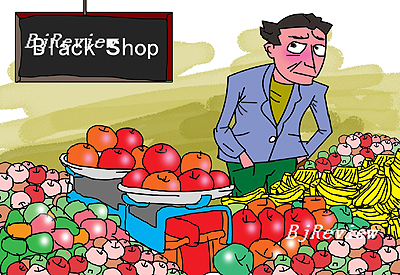
Vendors in Sanya's open market are learning the hard way that it doesn't pay to be dishonest. On April 30, a stallholder woke up to a surprise when officials meted out a new form of punishment for his reportedly repeated overcharging of consumers. A signboard reading "black shop" was hung outside his stall, informing the public that he was guilty of corrupt business practices. According to local regulations, the signboard will be removed only after the businessman has totally got rid of his dishonest habits.
In order to regulate the "anything goes" attitude of traders at the market, the local bureau for industry and commerce in Sanya, a scenic holiday spot in south China's Hainan Province, has come up with this unusual form of regulation--a variation of the "name and shame" method used in other cases around China to curb crimes. After shoppers lodge complaints that stallholders are giving them less produce than they pay for, the "black shop" signboards will be the end result.
Objectively, this punishment is designed to protect tourists and local shoppers from being overcharged by unscrupulous stallholders. However, many people disagree with the practice. They believe that to put a "black shop" signboard in front of a stall is deeply humiliating. The stallholders are also ordinary people like anyone else, they say, and no one has the right to humiliate them openly in such a way. Observers feel that although this tough punishment will no doubt bring instant results, the policymakers may not be considering the long-term effects this might have, both psychologically and on the market's future. "Does the level of cheating the public warrant the level of punishment?" is the question being asked.
Most stallholders will feel deep regret about their bad deeds, so a punishment of revoking their trading licenses is felt to be enough persuasion for them to get back onto the straight and narrow. But now, say observers, the stigma of the "black shop" signboards will make any form of rehabilitation very difficult for the wayward merchants.
In addition, many feel that if the bureau is not careful in the way it carries out the "black shop" initiative, the power of humiliation may be abused. For example, if certain stallholders have enemies, or are felt to be doing better business than others, it would be a simple task to report false information to the bureau about overcharging, resulting in damage to reputations that is irreversible.
Punishment has no legal basis
Sheng Dalin (China Youth Daily): Some people may argue that since "honest shop" signboards are welcome, why can't "black shop" signboards be introduced? But they forget that praise and criticism are judgments of a totally different nature and so should follow different standards. Originally, "black shop" signboards are designed to punish dishonest shopkeepers, but obviously, they have a humiliating impact. It seems that these signboards target people's character, rather than their behavior. Character is a basic human right and is thus sacred and inviolable. Even the dignity of criminals sentenced to death should be protected, let alone stallholders with only moral taints.
In Sanya, the punishment facing dishonest shopkeepers is not only to revoke licenses, but also to forbid them to trade in this business in the future. For the shopkeepers, this is already a severe penalty, so the "black shop" signboards are actually superfluous. Moreover, this punishment is somewhat illogical. Since the license has been revoked, which means a shop no longer exists, why should a "black shop" signboard be hung there?
Sanya's local commercial watchdogs and their supporters may argue that if the measures are not tough enough, market order can't be brought under control. Actually, the key does not lie in the severity of the punishment, but in the commitment to punish those who have broken the rules. In this sense, the most effective way to prevent dishonest shopkeepers from cheating consumers is to strengthen supervision, not to practice punishment without a legal basis.
Li Zhenzhong (www.china.com.cn): If a thief was identified with "thief" printed on his forehead by the police, this would turn out to be a huge humiliation and abuse and the police who are expected to execute laws would actually be violating laws. If commercial watchdogs are allowed to carry out such practice, where will it end? Dishonest restaurants will be labeled as "black taverns," and gradually we will see signboards like "black scenic spot," "black travel agency," etc. It's a fact that dishonest behavior toward tourists exist in all sectors of Sanya, so would it result in the National Tourism Administration proclaiming Sanya a "black tourist city?" If so, how can Sanya survive?
|
